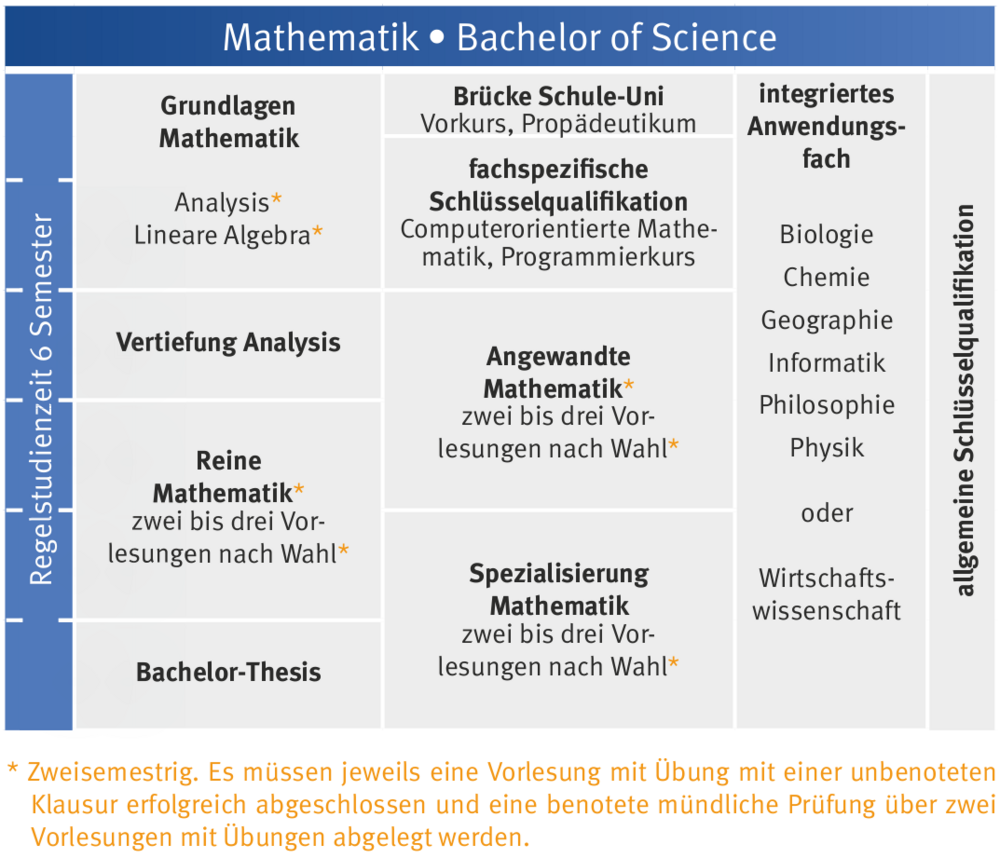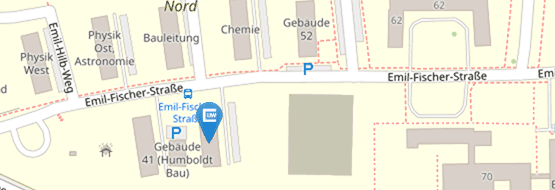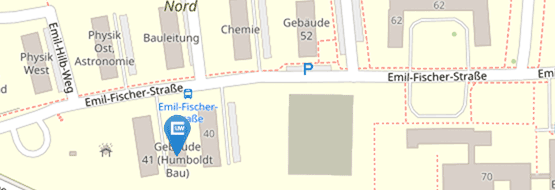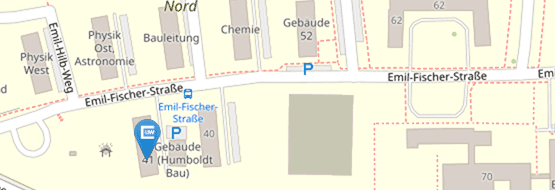Mathematics (Bachelor)
Bachelor's degree program in Mathematics
| Graduation: | Bachelor of Science |
| Normal period: | 6 Semesters |
| Enrollment: | Summer and winter semester |
| Admission: | No restriction |
| Benefit: | 180 ECTS points |
| Target group: | Students who want to acquire a broad and solid basic education in mathematics |
| Qualification targets: | Qualification targets Bachelor Mathematics (180 ECTS) |
| Accreditation: | program accredited till September 30, 2028 |

Starting mathematicians should
- become familiar with the characteristic methods of mathematical reasoning,
- acquire comprehensive knowledge in the methods of pure and applied mathematics
- independently arrange and solve mathematical questions
A study of mathematics promotes the
- ability to abstract thinking
- gift for penetrating complex issues
- perseverance and creativity in solving problems
Mathematicians are awarded regardless of economic status promising career prospects. According to STERN, "the unemployed mathematicians of Germany have space in a bus". A degree in mathematics (whether mathematics, business mathematics, computational mathematics, mathematical data science or mathematical physics) attests to the ability of the graduates
- to quickly get used to complex contexts,
- to identify the core of a problem and to remove the unimportant
- to find creative solutions
- use profound mathematical expertise that is not available to graduates of other courses of study.
This, together with visible knowledge of the needs of the "mathematics users" results in the entry ticket to a crisis-proof workplace. Needs such as the choice of application subjects in mathematics, for the sector of economics and finance, for applications in natural and engineering sciences in computational mathematics, for applications in data analysis in mathematical data science or usually for mathematical physics.
Construction
- The Bachelor's degree program Mathematics is divided into modules. Each module is completed with a module exam comprising one to two lectures. Passed examinations are awarded ECTS credits (not to be confused with the grades!), which should be equivalent to a workload of about 30 hours.
- In the first two semesters, with a substantially fixed curriculum, you will become familiar with the basics. In the second part of the study (semester three to six), you can choose lectures and seminars according to your inclinations. Towards the end of your studies, you will prepare your written bachelor thesis under the supervision of a lecturer.
- The Bachelor's degree program in Mathematics offers seven integrated application subjects (Biology, Chemistry, Geography, Computer Science, Philosophy, Physics, Economics) in which you must earn 30 ECTS credits.
- You attend lectures with exercises (usually four or three semester credit hours (SWS)), a seminar (two SWS), in the application subject poss. also internships. In addition there are subject-specific and general key qualifications (e.g. language courses) amounting to 20 ECTS.
Course of study plan (overview of modules to be completed, start in winter term)
Course of study plan (overview of modules to be completed, start in summer term)
Basics and orientation exam
After the second semester, the successful completion of a module from one of the two subsections Fundamentals Analysis or Basics Linear Algebra is considered to be a basic and orientation examination. If this cannot be fulfilled (and only then), the successful completion of at least one of the modules General Overview Analysis or Overall Overview Linear Algebra must be proven after the third semester. If this cannot be done either, the bachelor's degree program is regarded as definitely not passed.
Graduation
If you have earned 180 ECTS credits under the Examination Regulations, you will receive the academic degree of a Bachelor of Science.
Study and examination regulations
- General study and examination regulations for bachelor and master courses (ASPO)
- Subject-specific provisions for the bachelor's degree program in Mathematics (PO 2023)
The examination board is i.a. responsible for
- recognition questions at the beginning of studies for achievements acquired in previous study programs or at another study location,
- recognition questions in the current study
- gender equality
The Bachelor's degree programme in Mathematics can also be studied part-time (50%). The same subject-specific provisions and subject regulations apply to part-time study as for full-time study, except that the number of semesters is doubled. The standard period of study for a part-time degree programme is therefore 12 semesters. Accordingly, the requirements for the basic and orientation examination must be fulfilled after four or six semesters. Please note that a change from full-time to part-time study is only possible for two semesters (or multiples thereof).
As a rule, 15 ECTS credits per semester should be earned during a part-time programme. For flexible study organisation, it is possible to earn up to 20 ECTS credits per semester. Please note that if you earn more than 20 ECTS credits in one semester, two part-time semesters will be recognised. The exact regulations for part-time study can be found in Annex 4 of the General Study and Examination Regulations (ASPO).
Here you will find an exemplary study plan for a complete part-time degree programme (with Chemistry as an application subject). We recommend that you arrange a counselling interview with your academic advisor before starting a part-time degree programme.
There are four compulsory modules in the Bachelor program Mathematics:
- Overall Analysis (14 ECTS)
- Overview Linear Algebra (14 ECTS)
These are in each case an oral exam for Analysis I and II, respectively Linear Algebra I and II.
Also:
- Advanced Analysis (7 ECTS)
- Seminar (5 ECTS)
The elective area is divided into eight subareas, all of which must be covered. In total, 79 ECTS credits must be earned in this area.
- Grundlagen Analysis (8 ECTS, ungraded)
- Analysis I (8 ECTS)
- Analysis II (8 ECTS)
- Grundlagen Lineare Algebra (8 ECTS, ungraded)
- Lineare Algebra I (8 ECTS)
- Lineare Algebra II (8 ECTS)
- Grundlagen Reine Mathematik (9 ECTS, ungraded)
- Einführung in die Algebra (9 ECTS)
- Angewandte Algebra (9 ECTS)
- Einführung in die Differentialgeometrie (9 ECTS)
- Einführung in die Projektive Geometrie (9 ECTS)
- Einführung in die Funktionentheorie (9 ECTS)
- Geometrische Analysis (9 ECTS)
- Gewöhnliche Differentialgleichungen (9 ECTS)
- Grundlagen Angewandte Mathematik (9 ECTS, ungraded)
- Numerische Mathematik I (9 ECTS)
- Numerische Mathematik II (9 ECTS)
- Stochastik I (9 ECTS)
- Stochastik II (9 ECTS)
- Grundlagen Spezialisierung Mathematik (9 ECTS, ungraded): Zu diesem Unterbereich gehören alle Module aus den Unterbereichen Grundlagen Reine Mathematik und Grundlagen Angewandte Mathematik. Außerdem die Module der folgenden Liste. Es darf jedoch kein Modul eingebracht werden, das bereits in einem der beiden anderen Unterbereiche verwendet wurde.
- Optimierung für Machine Learning (9 ECTS)
- Einführung in die Diskrete Mathematik (9 ECTS)
- Einführung in die Funktionalanalysis (9 ECTS)
- Einführung in die partiellen Differentialgleichungen (9 ECTS)
- Einführung in die Zahlentheorie (9 ECTS)
- Einführung in die mathematische Logik (9 ECTS)
The following three sub-areas combine two modules from the sub-sections "Fundamentals ..." into an oral exam. You must not use a single module that has already been used in one of the other subsections.
- Gesamtüberblick Reine Mathematik (12 ECTS, graded)
- Gesamtüberblick Angewandte Mathematik (12 ECTS, graded)
- Gesamtüberblick Spezialisierung Mathematik (12 ECTS, graded)
However, not all combinations are allowed, only those listed in this list
The key qualifications (SQ) are divided into general SQ (5 ECTS) and subject-related SQ (15 ECTS).
With the general SQ, you can choose from a huge selection of suitable modules from all faculties. Very popular are language courses. The current list can be found on this site.
The subject-related SQs are further subdivided into
- Compulsory modules (11 ECTS)
- pre-courses (2 ECTS)
- Propädeutikum (2 ECTS, 1. Semester)
- Computerorientierte Mathematik (4 ECTS)
- Programmierkurs (3 ECTS)
- Elective Modules (4 ECTS)
- Ergänzungsseminar Mathematik (4 ECTS)
- Topologie (5 ECTS)
- Geschichte der Mathematik (5 ECTS)
- Mathematisches Schreiben (5 ECTS)
- Schulmathematik vom höheren Standpunkt (5 ECTS)
- Proseminar (4 ECTS)
- Stochastische Finanzmathematik (9 ECTS)
- Mathematische Aspekte der modernen Kryptographie (5 ECTS)
The bachelor thesis (BAT, 11 ECTS) is the last major examination in your bachelor program. This written work is designed to show that you are capable of scientifically handling a (mathematical) problem over a set period of ten weeks. No scientific new value is expected of you, but scientific approach.
At the very latest you should start with your BAT ten weeks before the end of your 8th semester, so that you can still use the full processing time to complete the work before the beginning of your 9th semester (with the beginning of the 9th semester, your Bachelor degree program is considered as failed for the first time!).
In order to get a topic for the BAT, you can (at first) be informed on the bulletin boards in front of the Mathematics Branch Library: there current topic suggestions depend on different subareas of mathematics and of different supervisors.
If you do not find it there, you should personally contact a lecturer in mathematics according to your mathematical interests (see Overview of the Chairs of the Institute of Mathematics) and define a topic directly with him / her (your own suggestions are possible!). Potential supervisors are all lecturers of mathematics ..
If you have found a supervisor and a topic for your BAT, then print this form fill it out with your supervisor and give it to Frau Schmid (Mathematik Ost, Zi. 00.016 ). This will make the topic of your BAT and the date of submission (date of issue of the topic + 10 weeks) official and binding.
Only in well justified cases (examination inability, with certificate!) the processing time can be extended on application with the examination board and in consultation with the supervisor.
For regulations concerning passing the thesis to the university see here.
In one of the application subjects at least 30 ECTS must be provided taking into account any compulsory modules.
At least 15 ECTS must be graded. These do not necessarily have to come from the same application subject.
Note temporal overlaps with other subjects
For winter semester 2011/2012, a so-called time window model for the organization of the courses was introduced at the University of Würzburg. This has the consequence that the application subject Biology in the first and possibly second semester due to overlaps cannot be practically studied and possibly can be started later. If you are interested in the application field Biology, please contact the Studienberatung early on!
Admission
The number of places for the application subject Biology are limited and are awarded by the Dean of Studies Mathematics (Prof. Siller). In the past, the maximum number has never been exhausted!
Registration deadlines and admission
- Those interested in the field of Biology have to register at the Department of Mathematics (Mathematics (East), Room 00.016, morning) until the Thursday of the first week of the lecture period of the respective semester (math-institut "ät" uni-wuerzburg.de).
- At the end of the registration deadline, the available places will be awarded depending on the grade of the graduation, the progress of the course and the receipt of the application. A once granted admission for the field of application Biology remains for the following semesters until the completion of the study program or a change of study program.
- Admission is forfeited if you do not attend an event in the application subject Biology at the latest in the third semester, or if you do not take any further modules in biology for more than two semesters.
Registration for exercise groups
Regardless of a decision of the Dean of Studies, please go to the Student Council Biology before the beginning of the semester to be divided into exercise groups (if you do not have any timetable overlaps).
Materials for download
The compulsory area consists of 21 ECTS. This means that at least 9 ECTS have to be selected from the elective area.
There are no mandatory modules in the application field Geography. All modules must therefore be taken from the elective area.
There are no compulsory modules in the application subject Computer Science. All modules must therefore be taken from the elective area.
There are no compulsory modules in the application subject Philosophy. All modules must therefore be taken from the elective area.
The compulsory area consists of 14 ECTS. From the elective area Physics 1 there are 3-9 ECTS, from the block Physics 2 7-13 ECTS to be chosen.
Subject-specific provisions for the Bachelor's degree program in Mathematics (PO 2015)
The structure of the program in PO 2015 keeps remained in PO 2023. The following changes have been made:
- The module "Angewandte Algebra" is new in the areas "Grundlagen Reine Mathematik" and "Grundlagen Spezialisierung Mathematik". With subsequent combination possibilities in the areas "Gesamtüberblick Reine Mathematik" and "Gesamtüberblick Spezialisierung Mathematik"
- The module "Operations Research" has been replaced by the module "Optimierung für Machine Learning".
- The module "Mathematische Aspekte der modernen Kryptographie" is new in the subject-related key qualifications.
- There are changes in the list of modules in the application subjects Biology, Informatics and Economy. For details please consider the new lists or the subject-specific provisions (PO 2023). There all changes are listed.






